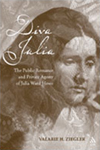Essay Draws Parallels Between TV's Prisoner and Gnostic Religions
March 11, 2009
 March 11, 2009, Greencastle, Ind. — "Recognized as the ultimate cult television show, The Prisoner remains, forty years after its original airing, a masterpiece," begins an article co-authored by Valarie Ziegler (pictured), professor and chair of religious studies at DePauw and Mark Holwager, a 2008 graduate of the University. Their essay, "‘They’ve Given You a Number and Taken Away Your Name’: Gnostic Themes in The Prisoner, Television’s Ultimate Cult Classic," is featured on the Web site of the Society of Biblical Literature.
March 11, 2009, Greencastle, Ind. — "Recognized as the ultimate cult television show, The Prisoner remains, forty years after its original airing, a masterpiece," begins an article co-authored by Valarie Ziegler (pictured), professor and chair of religious studies at DePauw and Mark Holwager, a 2008 graduate of the University. Their essay, "‘They’ve Given You a Number and Taken Away Your Name’: Gnostic Themes in The Prisoner, Television’s Ultimate Cult Classic," is featured on the Web site of the Society of Biblical Literature.
For the uninitiated, the authors explain, "Set in a beautiful seaside resort known only as 'the Village,' The Prisoner depicts the fate of Number Six, an unnamed government agent who was kidnapped after resigning his post. The Village is his prison and seeks to pry his secrets from him 'by hook or by crook.' To maintain his self respect and identity, Number Six must resist and insist, 'I am not a number! I am a free man!' Commentators have long noted that Number 6 is an archetypal hero confronting religious and existential  questions: What does it mean to be an individual? What does it mean to exist in society? What capacities for good and evil exist within each person? Is the Village a place or an existential condition? Is escape possible? Who or what is Number 1? These are questions to ponder as we view the pre-credit sequence."
questions: What does it mean to be an individual? What does it mean to exist in society? What capacities for good and evil exist within each person? Is the Village a place or an existential condition? Is escape possible? Who or what is Number 1? These are questions to ponder as we view the pre-credit sequence."
Ziegler and Holwager -- who was a religious studies major -- note, "Surprisingly, no one has discussed The Prisoner's striking parallels to Gnostic religions. Using the Gospel of Thomas and 'The Hymn of the Pearl' from the Acts of the Apostle Thomas, we will demonstrate how The Prisoner exemplifies the Gnostic myth of descent and return, depicting a hero who refuses to be fully embodied in the hateful world in which he is imprisoned, who insists (contrary to evidence) that he is from a truer world in a higher realm,  and who risks everything to return to the beginning and reunite with his genuine self."
and who risks everything to return to the beginning and reunite with his genuine self."
Access the complete essay by clicking here.
This spring, Professor Ziegler is teaching a course, Religion & Film: The Prisoner. She authored Diva Julia: The Public Romance and Private Agony of Julia Ward Howe, which received the Trinity Prize, and served as historian for an opera, Julia, which debuted in New York City in 2007. The libretto for the opera is taken from the letters of Howe (1819-1910).
Learn more in this previous story.
Back